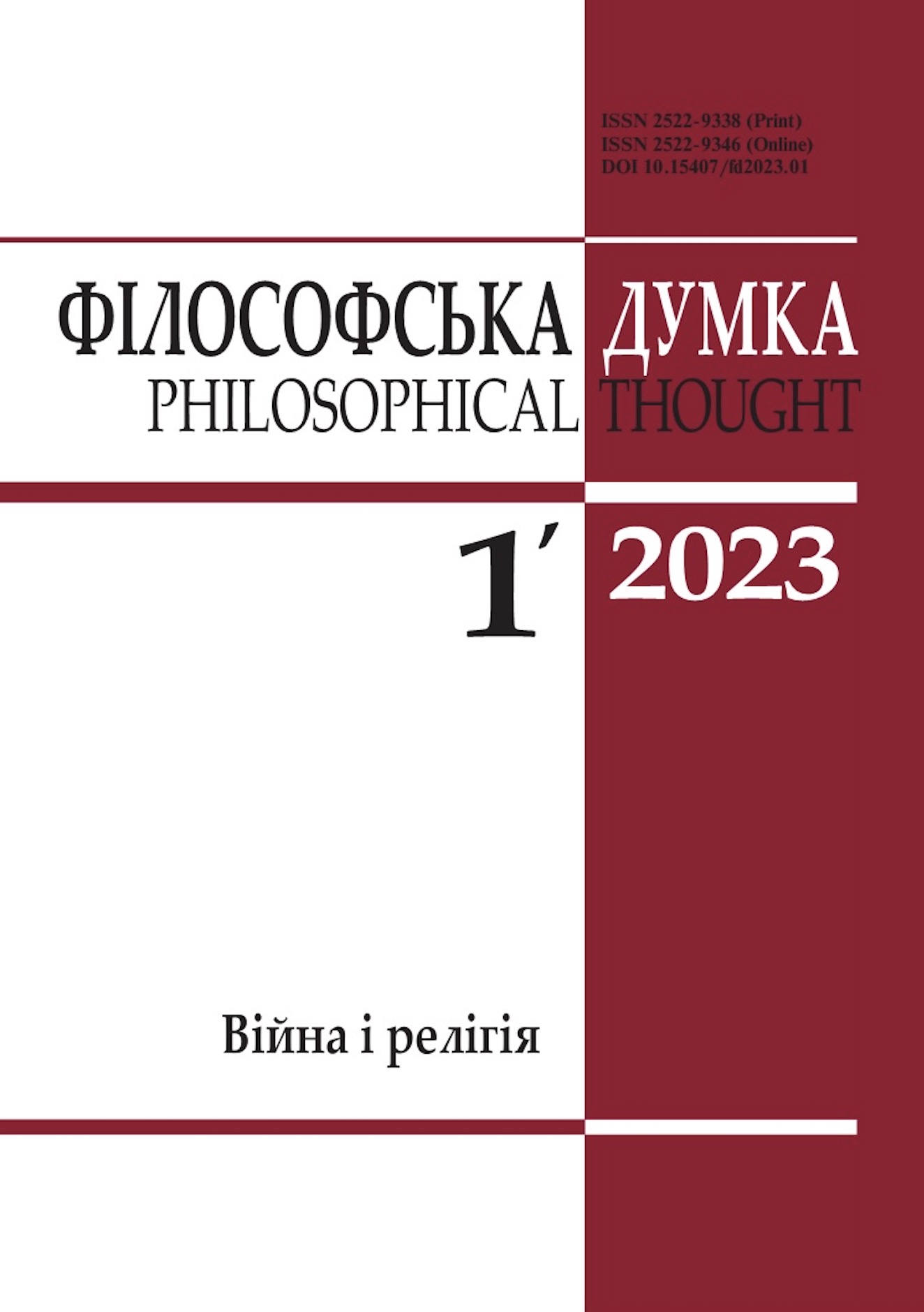GEORGES BATAILLE’S «INNER EXPERIENCE»: PUBLIC SELF-EXECUTION FOR THE SAKE OF COMMUNICATION
CONTEMPORARY HUMANITIES
DOI:
https://doi.org/10.15407/fd2023.01.162Keywords:
Georges Bataille, inner experience, labyrinth, surrealism, existentialism, poststructuralismAbstract
The paper outlines the theoretical and methodological complexity of the historical-philosophi- cal study of Georges Bataille’s literary and philosophical heritage, In: particular «Inner Expe- rience», one of his key works, which is about to be released in Ukrainian. To this end, I analyze the biographical and historical-philosophical contexts of writing «Inner Experience». I observe the main events of the thinker’s life, which led to the writing of this work and testify to Bataille’s opposition to the most common artistic movements of the time (surrealism), philosophical theo- ries (existentialism), religious teachings, and, in fact, anti-systemic nature of his work. In addi- tion, the paper tends to identify sources of influence on the formation of philosophical views of Bataille in the period of «Inner Experience» writing. In particular, I analyze the theoretical and political relations of Bataille, especially with his critics (Belgian surrealists group, G. Marcel, J.-P. Sartre), but also allies (M. Blanchot, P. Klossowski, M. Leiris, H. Masson and others). Further, I study the genesis of the concept of «internal experience» formation, its inherent multi- faceted, multi-layered,and metaphorical nature, rooting in the tradition of Christian mysticism and reflecting the state after the loss of faith at the same time. Particularly, I study the image of the labyrinth as one of the most expressive synonyms of internal experience term, which empha- sizes the meaning of this fundamental word-concept of Bataille’s philosophy. To provide the in- tellectual context, I list main points of Bataille’s «Inner Experience» critique by representatives of the French intellectual communities of the 1940s, as well as the main Bataille’s arguments against this critique. Eventually, I analyze the main ideas of his «Inner Experience», as well as the ways how Bataille’s philosophy influenced the key representatives of the French poststruc- turalism (J. Derrida, M. Foucault, J. Kristeva, J.-F. Lyotard).
References
Barthes, R. (1996). From Work to Text. [In Ukrainian]. In: M. Zubrytska (Ed.), Word. Symbol. Discourse. An Anthology of Literary and Critical Thought in the 20th Century (pp. 378-384). Lviv: Litopys.
Bataille, G. (1973). L'expérience intérieure. In: G. Bataille, Oeuvres complètes V (pp. 9-189). Editions Gallimard.
Bataille, G. (1976). Notice Autobiographique. In: G. Bataille, Oeuvres complètes VII (pp. 459- 462). Editions Gallimard.
Boldt-Irons, L.A. (1995). Introduction. In: L.A. Boldt-Irons (Ed.), On Bataille: Critical Essays. State University of New York Press.
Botting, F., Wilson, S. (Eds.) (1997). The Bataille Reader. Blackwell Publishers Inc.
Burger, P. (2002). The Thinking of the Master. Bataille between Hegel and Surrealism. Northwestern University Press.
Butsykina, Y. (2015). Georges Bataille's concept of transgressive experience: aesthetical analysis. [Doctoral dissertation, Taras Shevchenko National University of Kyiv]. [In Ukrainian]. http://scc.knu.ua/upload/iblock/77a/dis_Butsykina%20Y.O.pdf
Butsykina, Y. (2021). Commentary on the ukrainian translation of "Inner Experience" by Georges Bataille. [In Ukrainian]. Δόξα / Doksa. Zbіrnyk naukovykh prats' z fіlosofії ta fіlo- lohії, 1 (35), 24-31. DOI: https://doi.org/10.18524/2410-2601.2021.1(35).246717
https://doi.org/10.18524/2410-2601.2021.1(35).246717
DeBoer, J. (1999). Fierce Language: Bataille Versus Theory. Apsinthe Literary Review, 2 (3), 1-6. Fraser, J. (2022). Industrial Music and Inner Experience: Aural Abrasion as a Window to Post-Subjectivity. In: Bodies, Noise and Power in Industrial Music (pp. 129-142). Palgrave Macmillan, Cham.
https://doi.org/10.1007/978-3-030-92462-1_8
Hewson, M., Coelen, M. (2016). Introduction. In: M. Hewson, M. Coelen (Eds.), Georges Bataille. Key Concepts. Routledge.
https://doi.org/10.4324/9781315657363
Kendall, S. (2007). Georges Bataille. Reaktion Books Ltd.
Kendall, S. (2021). Georges Bataille and the Fate of the Sacred. Retrieved from: https://www.academia.edu/32146193/Georges_Bataille_and_the_Fate_of_the_Sacred
Klossowski, P. (1963). Le simulacre dans la communication de Georges Bataille. Critique: Hom- mage à Georges Bataille, 195-196, 742-750.
Lechte, J. (2021). Bataille: Image and Victim. Theory, Culture & Society, 38 (4), 3-22.
https://doi.org/10.1177/0263276420986618
Noys, B. (2000). Georges Bataille: a critical introduction. Pluto Press.
Poppenberg, G. (2016). Inner Experience. In: M. Hewson, M. Coelen (Eds.), Georges Bataille. Key Concepts. Routledge.
Prushkovska, A. (2019). Dance of expenditure: Winners of the Nelli Ivanova-Georgievska Prize. [In Ukrainian]. Filosofska Dumka, 3, 70-76. DOI: https://doi.org/10.15407/fd2019.03.070
https://doi.org/10.15407/fd2019.03.070
Sartre, J.-P. (1975). Un nouveau mystique. Critiques littiraires (Situations. I) (pp. 174-229). Paris: Gallimard (Idees).
Stronge, W. (Ed.) (2017). Georges Bataille and Contemporary Thought. Bloomsbury Publishing.
Downloads
-
PDF (Українська)
Downloads: 320
Published
How to Cite
Issue
Section
License
Authors who publish with this journal agree to the following terms:
- Authors retain copyright and grant the journal right of first publication.
- Authors are able to enter into separate, additional contractual arrangements for the non-exclusive distribution of the journal's published version of the work (e.g., post it to an institutional repository or publish it in a book), with an acknowledgement of its initial publication in this journal.
- Authors are permitted and encouraged to post their work online (e.g., in institutional repositories or on their website) prior to and during the submission process, as it can lead to productive exchanges, as well as earlier and greater citation of published work (See The Effect of Open Access).


